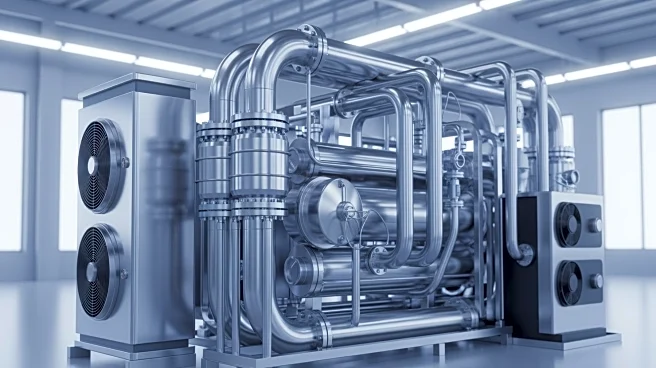What's Happening?
Epic Group has installed high-temperature industrial heat pumps at its new apparel manufacturing hub in Bhubaneswar, India. This facility, operated by Trimetro Garments India Private Limited, is set to
begin commercial production on December 1, 2025, and aims to function as a net-zero carbon site. The heat pumps, developed in collaboration with TRIGeN and Tonello, provide 135°C pressurized hot water for dryers, significantly reducing carbon emissions. This initiative is part of Epic Group's commitment to decarbonizing industrial heat, a major contributor to carbon emissions in the fashion industry.
Why It's Important?
The installation of high-temperature heat pumps marks a significant step towards sustainable manufacturing in the fashion industry. By transitioning to renewable electricity-powered heat processes, Epic Group is setting a precedent for reducing carbon emissions. This move not only aligns with global sustainability goals but also positions Epic Group as a leader in eco-friendly manufacturing practices. The successful implementation of this technology could encourage other industry players to adopt similar measures, potentially leading to widespread environmental benefits.
What's Next?
Epic Group's pilot project aims to demonstrate the feasibility and cost-effectiveness of using heat pumps in industrial settings. If successful, this could lead to broader adoption across the fashion industry, driving down costs and enhancing sustainability. The project also involves upgrading electrical infrastructure to support the heat pumps, indicating potential future investments in renewable energy solutions. Stakeholders in the fashion industry may closely monitor this development as they consider their own sustainability strategies.
Beyond the Headlines
The use of heat pumps not only reduces carbon emissions but also provides cooling as a byproduct, improving working conditions for employees during extreme heatwaves. This dual benefit highlights the potential for innovative technologies to enhance both environmental and social aspects of manufacturing. As the industry moves towards decarbonization, ethical considerations regarding worker welfare and environmental impact are becoming increasingly important.










